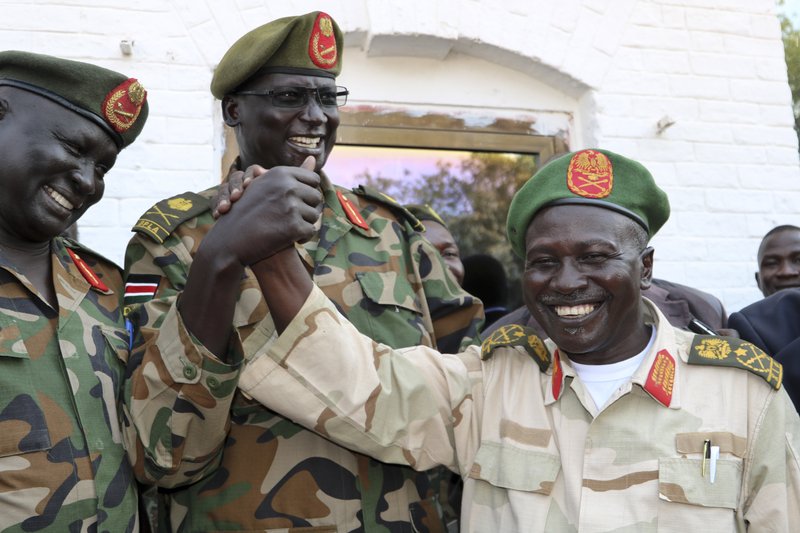
(Photo: AP)
Stepping out of a helicopter last week, South Sudan armed opposition commander Ashab Khamis came face-to-face with his rival in a crushing five-year civil war, army Gen. Keer Kiir Keer.
The meeting, witnessed by The Associated Press, was their first attempt at reconciliation since the conflict began and a crucial test of a new peace agreement ending a war that has killed nearly 400,000 people.
The governor of Wau state where the meeting occurred called it a “historic event,” while the atmosphere around the table was tense. Surrounded by bodyguards, the regional commanders glared at each other as words of encouragement were laced with accusations.
While they eventually pledged to work together, deep-seated distrust lay behind the handshakes as South Sudan’s warring sides, blamed for vicious abuses against civilians and each other, are now under international pressure to get along — and eventually merge.
After the meeting, opposition commander Khamis told the AP that South Sudan’s government continues to instigate attacks for political gain. “It’s trying to use force to gain more ground in order to prepare for elections,” he said.
Army spokesman Lul Ruai Koang called such accusations baseless, saying the East African nation’s political landscape now will be determined politically, not militarily.
South Sudan’s latest peace deal, signed in September, is moving gingerly along, with eight months to prepare for a three-year transitional period leading to elections. Observers say progress has been riddled with missed deadlines, cease-fire violations and questionable political will.
At the meeting in Wau, the AP watched both sides exchange accusations, blaming violations on “undisciplined officers” for whom neither party took responsibility.
The meeting was one of several planned for other regional commanders around the country by the international body charged with monitoring South Sudan’s cease-fire and the peace deal’s implementation. The workshops are aimed at helping the two sides communicate before joining forces in a single army in the months ahead.
Disseminating information through the fighters’ ranks about the peace deal “can be slow and difficult,” said Evans Oguga, one of the coordinators.
Yet even as the monitoring body tries to build trust, it faces criticism for not pushing the government hard enough to hold accountable those violating the new peace.
To date, just two of the body’s four reports on cease-fire violations have been made public as required.
The two unpublished reports, seen by the AP, include detailed accounts of violations and name names.
One of those named is the general representing the government at last week’s meeting, Keer. He is accused of launching offensives in the Wau region between June and October that led to the killing and displacement of civilians and denied access to the monitoring body’s investigators. He has denied similar allegations made by Human Rights Watch.
The latest report, dated Nov. 7, urges the government to look into the accusations as a matter of “urgency,” yet Keer remains in his post.
The monitoring body did not respond to a question about why the reports haven’t been published.
In a statement this month, the United States, Britain and Norway “troika” responsible for helping South Sudan gain independence in 2011 reminded the monitoring body to be “independent of national interests and empowered to hold the parties to account.” The statement called for reports to be published in full.
“There is a long-standing approach from international bodies in South Sudan that it is better not to publicize negative information as it ‘hardens the positions of the parties,’” Klem Ryan, former coordinator of the UN experts monitoring sanctions on South Sudan, told the AP.
Accountability is needed as South Sudan’s government tries to reinforce its control in once-contested areas by moving civilians into them, observers say. That would strengthen its hand in the upcoming elections.
An internal report by one humanitarian organization, seen by the AP and corroborated by an eyewitness, describes the government in September repopulating the town of Mboro after capturing it from opposition forces in June. Most of the civilians had never lived there, it said. One local official described the actions as in line with a “broader political strategy.”
One expert, however, said there’s no incentive for the government to gain more control on the ground. The real problem in the continuing chaos is the lack of chain of command, said Augustino Ting Mayai, a researcher at the Sudd Institute in Juba.
It is in this uncertain environment that South Sudan’s rivals are now being coaxed into promises of peace.
Standing solemnly after their meeting last week in Wau, the two commanders relaxed slightly. Towering over his counterpart, the South Sudanese general forcefully grabbed the hand of the armed opposition commander and pumped their fists in the air.
“It’s true we’ve been fighting,” the general said. “He attacks me, I attack him, but now it’s over.”


